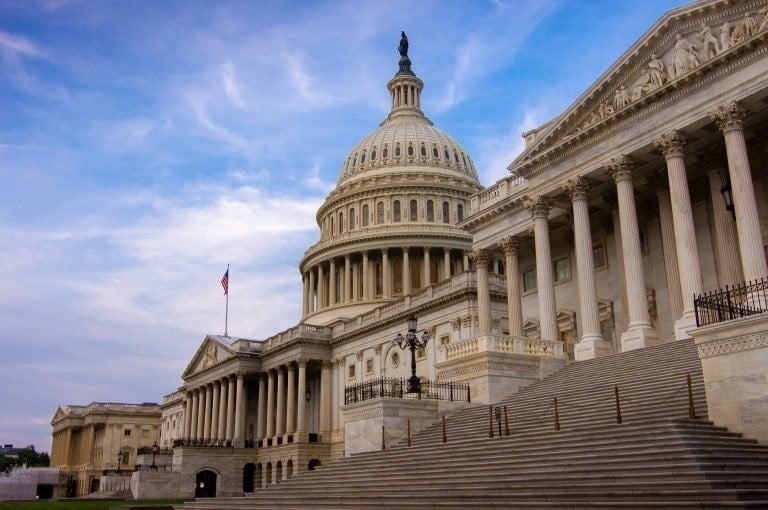- Reforma fiscal
- Artículo
- Lectura de 6 minutos
- Last Updated: 03/17/2025
Congress Finds a Way to Avoid Shutdown of the Federal Government

Table of Contents
The U.S. Senate passed a bill to fund the government for the next six months hours before federal funding ran out on March 14. The president signed it into law on Saturday.
The bill, which originally faced the challenge of needing 60 votes necessary to pass, ended up only needing a simple majority when earlier in the day enough Democrats joined with Republicans on a procedural vote to let the bill come to floor. Most of the Democrats that let the bill come to the floor then voted against its passage.
The bill proposes funding the federal government through the end of the government’s fiscal year 2025. The House of Representatives narrowly passed a similar bill by four votes earlier in the week.
The continuing resolution (CR) increases slightly the defense budget and funding for veterans’ health care while cutting $13 billion to domestic, non-defense programs through Sept. 30, 2025.
The division between the two parties is evident, but the challenges to get to this latest CR revealed some of the increasing divisions within each party. The next challenge over the next six months is to pass a budget, otherwise the government faces another shutdown.
The federal government has operated under several continuing resolutions since Oct. 1, 2024. Since 1995, there have been six shutdowns, including four in the past decade. Economically, the absence of a budget is costly. The Congressional Budget Office estimated the 2018-19 shutdown hit the Gross Domestic Product (GDP) to the tune of an $11 billion reduction.1 Long shutdowns also hurt private-sector investment because, among other impacts, access to federal loans is disrupted. As for taxpayers, $4 billion of their money was wasted during the three shutdowns since 2013.2
Businesses and their employees should understand more about what a government shutdown is and how it might impact them and then plan accordingly.
What Is a Government Shutdown?
A government shutdown means the government can’t spend money that requires annual appropriations, which affects its ability to pay its employees and keep facilities and buildings open where those employees work. Some employees are considered essential such as air traffic controllers and would have to work without pay during the shutdown.
Unlike previous shutdowns, however, the Government Employee Fair Treatment Act of 2019 entitles federal employees to backpay for as long as the appropriations are lapsed.
It should be noted that employees of federal contractors are not guaranteed backpay under this 2019 law, but a company can decide if they want to provide backpay to these employees.
What Agencies and Services Would Be Affected by a Shutdown?
Here are some closures or partial closures that could impact your business based on previous shutdowns:
- Small Business Administration (SBA): Most of the SBA’s loan approval and processing (e.g., microloans, working capital loans, etc.) would be unavailable during a shutdown.
- Internal Revenue Service (IRS): All tax payments and filed returns will continue to be accepted as the IRS hits the peak of tax filing season, but refunds might arrive after a shutdown ends. The exception to that is e-filed, error-free returns with direct deposit refunds.
- Expect delays in correspondence from the IRS.
- All IRS toll-free hotlines will be closed, impacting the ability to get a client EIN Verification via this method.
- E-Verify: The federal internet-based employment verification system will be unavailable for employers to complete the process, but businesses are still required to complete the Form I-9 for new hires. If your business is in a state that mandates the use of E-Verify, you should check with your state’s website for information, including on alternative methods for employee verification.
- Delays should be expected with onboarding new employees.
On-site audits and food/environmental inspections might be put on hold by agencies such as OSHA, the Department of Labor, the National Labor Relations Board, and others.
Medicare and Medicaid are federal programs that are not subject to annual appropriations, but a shutdown could cause a disruption for participants. For example, there might be a delay in getting Medicare replacement cards. Access to call centers and federal healthcare marketplace resources could be lost, as well.
How Could Businesses Be Impacted by a Shutdown?
There are tangential impacts to consider such as the closing of national parks and national museums (e.g., Yosemite, the Smithsonian) during a shutdown that could affect businesses that rely on the patronage of federal employees or tourists.
States might have to suspend their unemployment programs and possibly find alternative sources of funding because federal unemployment funding to states will cease during a shutdown.
Although most shutdowns in U.S. history have not influenced the stock market because their durations were brief, a shutdown of significant length could shift the stock market. This would impact employee retirement plans (401k), as well as delay federal reports on job growth, housing starts, and other indicators that investors rely on to make decisions.
What Won’t Be Impacted by a Government Shutdown?
Based on previous shutdowns, the list is small of federal agencies and processes that continue to function through a shutdown.
- Social Security checks will go out to recipients. However,
- Social Security Administration will not issue Social Security cards.
- The Employee Services toll-free hotline will not be available.
- Medicare open enrollment should not be impacted.
- Medicaid enrollment is handled through individual states.
- The U.S. Postal Service may continue to deliver the mail.
- Members of Congress still get paid.
What’s Next?
Accounting professionals and financial advisors should have conversations with their impacted clients to gain a better understanding of each client’s financial situation and be prepared to offer any resources that might help.
Paychex continues to monitor the developments in Congress and will provide updates as the legislative branch works toward producing a bill that funds the government. We understand the challenges facing employers and offer educational resources and a variety of funding options to consider that might fit your business needs.
1 Effect of Partial Shutdown Ending January 2019, Congressional Budget Office
2 The True Cost of Government Shutdowns, U.S. Senate report, 2019
Tags







